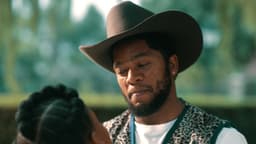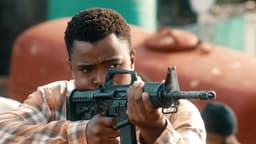
Director Nadine Cloete on Showmax's The Station Strangler
Showmax has just released the trailer for The Station Strangler, premiering on Showmax on Wednesday, 6 November 2024.
The latest true-crime feature documentary from IdeaCandy (Tracking Thabo Bester, Devilsdorp), The Station Strangler investigates the serial killer with the same nickname, who is believed to have killed 21 young boys and one adult from the mid 80s to the mid-90s on the Cape Flats.
Norman Simons, a school teacher, was arrested but only convicted of one of the murders: 10-year-old Elroy van Rooyen. Twenty-eight years after his imprisonment, Simons was released on parole, opening up fresh wounds in a community where justice has been denied for too long.

The Station Strangler features interviews with family members of the victims, lead investigator JD Kotze, serial killer profiler Micki Pistorius, and Dr Allan Boesak, among others.
Director Nadine Cloete won the Audience Award at Encounters for Action Kommandant, while Address Unknown won the SAFTA for Best Short Film. She is also the Production and Development Manager for Non-Fiction at the National Film and Video Foundation.
Watch the trailer for The Station Strangler
Reviewing its premiere at Silwerskerm in August 2024, Sunday Times called The Station Strangler “chilling”, adding: “Cloete is a formidable force in South African filmmaking, known for her fearless explorations of the country’s most poignant and untold stories… With The Station Strangler, she continues to challenge and redefine documentary filmmaking… infusing the documentary with a depth of empathy and meticulous storytelling.”
We caught up with Cloete to find out more.
How did The Station Strangler documentary come about?
IdeaCandy contacted me. They were looking for a director for this documentary that they were doing. They have an amazing reputation, so I immediately wanted to work with and learn from them.
They then called me into a meeting and told me what the subject matter was. I was taken aback because this was a subject I knew about. All kids of colour grew up with this story; the Station Strangler was a type of bogeyman.
So I felt this was a subject I would want to tackle because it is both a criminal case and a story of history and identity.
What was the most difficult part of making this documentary?
The most challenging interview was the one with the criminal profiler, Micki Pistorius. That’s when everything became real.
I think in the other interviews, I could almost separate myself emotionally. But with her, because she went so deep into the psychology of the serial killer, it was just so intense.
Going into those spaces was challenging. Dealing with the case in front of you, the facts and the evidence, and then seeing those things was super difficult.
Twenty-one boys were killed. You think what it means for childhood, for people who grew up close to that community in that era. If I tell anyone that I’ve done a documentary about the Station Strangler, they have a story to share about their experience during that time.
How did you go about getting a balanced approach to the story?
Well, the first person we interviewed was Ruth Jakuja, the ex-magistrate who wrote The Station Strangler: In the Case of S v Azval S Simons. She’s one of the people who feel that Norman Simons is innocent. I think that helped because it set the tone: for the rest of the interviews, I took what she said and tried to balance things against her arguments.
How did you go about approaching the victims’ families?
It was a mix. For example, the Van Rooyen family was very keen to speak. Elroy van Rooyen’s aunt, Florence, still had a lot of anger towards Norman Simons. So getting the buy-in of the family was an immediate yes. However, Ryno [Elroy’s cousin] was not sure if he wanted to participate. I went to see him in person and spoke to him and then he agreed to speak. He was very supported by his family.
The Samaai family were a bit more hesitant to be interviewed because it was very difficult for them. While Van Rooyen’s case went to trial, the same didn’t happen for the Samaais. They still have so many questions.
Interestingly, there was a day when we had organised an interview with one of the Samaai sisters and she was running late, and another sister, Pam, was there. Pam told us that she had kept all the newspapers related to the case. So the scene in the documentary, where she was taking out all the newspapers on their kitchen table, that was not even planned, it was something that just happened on the day. I think doing a scene like that, which was organic for the family, helped with the rest of the interviews with the Samaai family.
An eye-opener for us was that we borrowed the newspapers in order to do extra scans, and shortly after that, they checked up on it because they said those were their only memories of their brother. It just reminded me that in our own ways, we all have experiences with this case, but then there are people who live it every day, and those newspapers and articles are the only links they have to a family member who’s now gone.
This is such a stunning tribute as well to the people of Mitchells Plain. Can you talk about how you approached involving the community in how you told the story?
Number one for me was that I didn’t want to show people of colour in a stereotypical way.
And then I worked on how I could involve the community. There were a few activists on the ground helping us, especially to find families like the Samaais and the Cupidos. They also played a major role in getting the community on board to make the film. The community was aware of what we were doing and just allowed us to be in their space.
We must remember that Mitchells Plain was a very young community when the murders began. It was a mix of first-time homeowners and people who had been forcibly removed. It was really a community trying to establish itself.
One of the women we interviewed, Sandra Cupido, told us that their family was one of the first to move into Mitchells Plain, so they really built that community and kept that community’s support throughout the years.
Why should people watch this documentary?
I think that anyone who was triggered by the release of Norman Simons last year should definitely watch the film. Because the story touched an entire generation, people who still have questions should see the film. It is a part of our people’s history and to fully understand our people, people need to see this film.
More like this

Brakpan Chronicles: Die mense sê, kom in
Watch the hard-hitting trailer for the two-part documentary series Brakpan Chronicles, premiering on Showmax on Friday, 20 February 2026.

Wizkid: Long Live Lagos (2025)
This intimate and uplifting documentary explores Grammy-winning Nigerian artist Wizkid's rise to superstardom as one of the biggest Afrobeats artists.

Law & Order Toronto: Criminal Intent S1-2
This spin-off of the hit crime drama franchise follows an elite squad investigating corruption and high-level white-collar crime in Greater Toronto.

Helderberg S1
South Africa suffered its worst air disaster in 1987. The hunt for the truth about what happened to SAA Flight 295 is still on almost 40 years later.

Masinga - The Calling (2024)
Inspector Masinga is dispatched back to Africa on a sex-trafficking case, and once he's home, he tries to find justice for the killing of his brother.

Fana Mokoena on playing a sangoma in Masinga
SAFTA winner Fana Mokoena talks about portraying a sangoma in the gripping crime thriller, Masinga - The Calling. Stream from 5 December on Showmax.

Diddy: The Making of a Bad Boy (2025)
This sensational documentary delves into the rise and fall of Diddy, offering insight into his childhood, his meteoric rise, and his arrest.

Why Jackie Phamotse says Slay Queens is a must-watch
Jackie Phamotse opens up about her role on Slay Queens, her experiences and why the documentary should be required viewing. Stream now on Showmax.
Outlaws, now streaming on Showmax
Go on holiday with RHUGT: Africa
More Showmax Originals you'll love

MaBlerh to host the first-ever The Real Housewives Ultimate Girls Trip: Africa reunion
MaBlerh will host the first-ever reunion for The Real Housewives Ultimate Girls Trip: Africa, set to air in two parts in February 2026.

Nhlanhla Kunene confirmed for Law, Love and Betrayal Season 2
See Nhlanhla Kunene in Law, Love and Betrayal Season 2 as Mondli Gumede, from 8PM on 8 March on Mzansi Magic, and streaming from 9 March on Showmax.

Christall dishes on The Real Housewives Ultimate Girls Trip
Christall Kay on the drama of The Real Housewives Ultimate Girls Trip: Africa, and what it was like to reunite with Evodia. All episodes on Showmax.

Brakpan Chronicles: Die mense sê, kom in
Watch the hard-hitting trailer for the two-part documentary series Brakpan Chronicles, premiering on Showmax on Friday, 20 February 2026.
Latest Stories

Schalk Bezuidenhout trades stand-up for 9-5 in Die Kantoor

A heartbreaking loss: Nolwandle Biyela’s final stand in Outlaws Season 2

Fall in love with romantic drama Touch, now on Showmax

Antonie Marx on Volspoed and why it's a must-watch

Sandra Stein makes her debut on Law, Love and Betrayal S2

Albert Pretorius on Die Kantoor, SA’s re-imagining of The Office

20+ addictive South African reality shows to stream

Where to watch The Real Housewives franchise online

How to Train Your Dragon: Bringing Hiccup and Astrid to life

What to watch on Showmax in January 2026

7 things to know about indie award-winning movie Dìdi

Mission: Impossible – The Final Reckoning’s South African stunts

Die Kwiksilwers (2024)

Where to see the cast of Mpondoland on Showmax

Angel on The Real Housewives Ultimate Girls Trip, Jojo and more

Thandolwethu Zondi on his new role in Outlaws S2
Must-watch trailer for Showmax's turbo-charged reality series Volspoed

The Real Housewives Ultimate Girls Trip cast on first impressions, beefs and more

Fana Mokoena on playing a sangoma in Masinga

Princess Jecoco on The Real Housewives Ultimate Girls Trip Africa

Tlali returns: Outlaws’ most loved and hated villain is back

Novocaine: the US box office hit shot in Cape Town

Why Jackie Phamotse says Slay Queens is a must-watch

Evodia on Ultimate Girls Trip Africa and her return to reality TV







